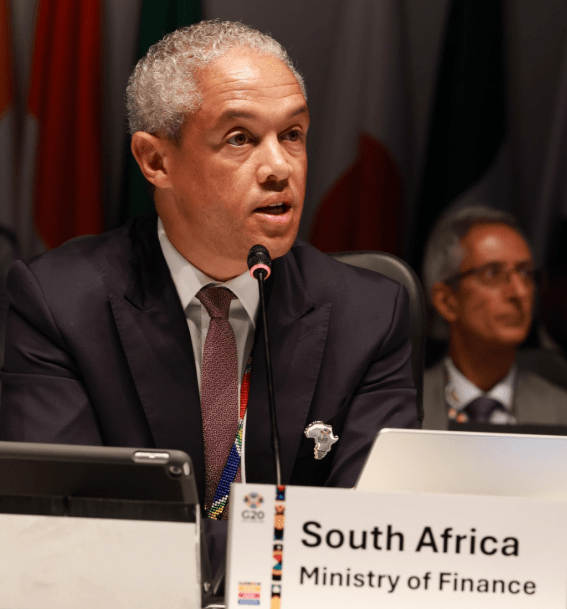
Treasury director general Duncan Pieterse. (File photo)
The treasury has urged civil society organisations and citizens to participate in governance processes by holding the country’s failing municipalities accountable for their budgets and spending.
A webinar, titled “From your pocket to public services: tracking municipal budgets” and hosted by the treasury this week, highlighted the ways in which people can monitor municipal spending using publicly available financial data and report irregularities for investigation.
Treasury director general Duncan Pieterse said the aim of the meeting was to equip civil society to play a role in ensuring that funds are spent responsibly,appropriately and transparently on the delivery of services.
“We want to provide citizens with a better understanding of the local government fiscal framework, municipal budgets, the data collection process, how municipal expenditures translate into service delivery, and how to better use the current financial data to hold their municipalities accountable,” he said.
“We hope that the information that we share today will equip citizens to engage meaningfully in municipal consultation processes such as the integrated development planning or IDP and budgeting processes in their respective municipalities.”
Pieterse said the treasury had launched the open local government data portal www.municipalmoney.gov in 2016 to provide citizens with access to comparable and verified information on the financial performance of each municipality.
“Municipal Money aims to promote transparency and citizen engagement through the visualisation and demystification of information about municipal spending.” Pieterse said.
“Civil society in South Africa contributes significantly to fostering a democratic environment where governance and accountability can thrive.
“Civil society organisations and ordinary citizens should be actively involved in exercising oversight and holding leadership accountable, using their voice in governance and decision-making processes to ensure that their concerns are addressed. This will lead to one desired result, an improvement in the lives of people in municipalities, to better budget management and service delivery,” he said.
Patrick Sokhela, chief director for international cooperation at the department of public service and administration said the government was reviving the Open Government Programme (OGP) to ensure it was up to international standards.
South Africa became a founding member of the OGP in 2011 along with Brazil, Indonesia, Mexico, Norway, Philippines, United Kingdom and United States when it endorsed the Open Government Partnership, a global initiative aimed at securing commitments from national and sub-national governments to promote open government, combat corruption and improve governance.
The initiative brings together governments and civil society organisations to work together on open government reforms to promote transparency, accountability, and citizen participation in government.
Sokhela said the treasury was playing a key role in reviving the programme.
“The national treasury leads the first commitment on transformative fiscal transparency, which seeks to ensure that citizens have access to fiscal information, that will empower them to hold public representatives accountable and in turn, combat corruption,” he said.
The treasury’s senior manager, Sello Mashaba, and the director of local government budget analysis, Mandla Gilimani, focused on section 71 of the Municipal Finance Management Act (MFMA), which outlines the reporting requirements for municipalities to provincial treasuries and how citizens can access these reports to hold local government accountable.
These reports provide a detailed overview of municipal revenue and expenditure against their approved budgets, facilitating same year management and oversight.
Gilimani said municipalities submitted quarterly and monthly financial reports to the treasury that are publicly accessible on its website and which serve as early warning systems in the monitoring of financial activities.
These include monthly reports, the Funded Budget, the State of Local Government Finances Report, the Auditor General’s Report, the Ratios Circular 71 and 88, and Section 138 and 140 Triggers Quarterly Reports, which indicate when a municipality is experiencing serious financial problems. The reports include data such as financials on payments made to Eskom and the water boards, revenue billing and collection information.
“We want the public to be aware of the availability of the monthly report that is done by municipalities and submitted to the national treasury database on a monthly basis.”
“We want the public to be empowered that they are able to interpret that report, and also to be aware that this report serves as a mechanism to track the performance of a municipality, which then can be reported to our oversight bodies, which is the provincial treasuries … then they can engage with that information and intervene if there is a need to,” he said.
He said municipal budgets should be funded realistically, based on what has happened in the past year.
“We often notice that municipalities will just inflate revenue projections, and also with the aim of justifying the expenditures that they are putting into those budgets,” he said.
“We also have the state of Local Government Finance Report. This report is based on the audit outcomes that would have been issued. So it’s a report that will definitely tell us, realistically, what is happening at municipalities.
“Do we have an increase in the municipalities that are in financial distress, or do we see an improvement in that regard?”
He said the reports are all available on the treasury website.



